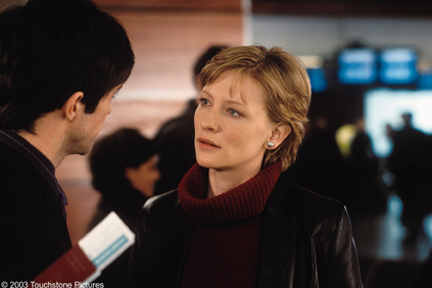 Caught Veronica Guerin over the weekend, and, well, frankly, don’t bother. I had hoped Cate Blanchett might make this project interesting, but this by-the-numbers Joel Schumacher schmaltzfest never rises above the level of a Lifetime channel movie of the week. It breezes through scene after scene of Guerin’s tough-as-nails-with-a-heart-of-gold interview style and the obligatory home v. work domestic squabbles like Scriptwriting 101, and never gives us a very interesting portrait of its protagonist, other than to cast her as some neglected patron saint of journalism. Similarly, the bad guys have become really bad — While the real Guerin took on a cannabis cartel, this film’s gangsters are trafficking in heroin, resulting in grim visions of needle parks, toddlers playing with syringes, strung-out teenagers prostituting themselves, and sundry other shocking evils that have little basis in Guerin’s real story. If anything, the film’s dependence on so many standard cinematic cliches is a disservice to the real Veronica Guerin, who was murdered by Dublin’s criminal element for exposing the truth to the light of day. Why obscure her tale and besmirch her ultimate sacrifice in the line of duty by stripping it of the character nuances and human complexities that separate the real world from dramatic convention? A sadly mechanical genre exercise devoid of anything but formula, Veronica Guerin is a missed opportunity and a shame.
Caught Veronica Guerin over the weekend, and, well, frankly, don’t bother. I had hoped Cate Blanchett might make this project interesting, but this by-the-numbers Joel Schumacher schmaltzfest never rises above the level of a Lifetime channel movie of the week. It breezes through scene after scene of Guerin’s tough-as-nails-with-a-heart-of-gold interview style and the obligatory home v. work domestic squabbles like Scriptwriting 101, and never gives us a very interesting portrait of its protagonist, other than to cast her as some neglected patron saint of journalism. Similarly, the bad guys have become really bad — While the real Guerin took on a cannabis cartel, this film’s gangsters are trafficking in heroin, resulting in grim visions of needle parks, toddlers playing with syringes, strung-out teenagers prostituting themselves, and sundry other shocking evils that have little basis in Guerin’s real story. If anything, the film’s dependence on so many standard cinematic cliches is a disservice to the real Veronica Guerin, who was murdered by Dublin’s criminal element for exposing the truth to the light of day. Why obscure her tale and besmirch her ultimate sacrifice in the line of duty by stripping it of the character nuances and human complexities that separate the real world from dramatic convention? A sadly mechanical genre exercise devoid of anything but formula, Veronica Guerin is a missed opportunity and a shame.
Category: Reviews
Overkill Bill.
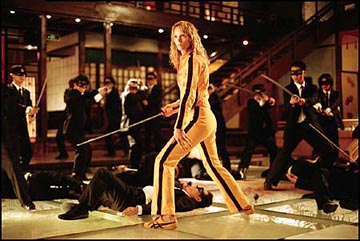 Well, I’m probably going to lose some fanboy cred for this, but I found Kill Bill (billed everywhere — even, ridiculously, in the credits — as “the 4th film by Quentin Tarantino”) to be a considerable disappointment. The movie starts off well…Uma’s The Bride covered in blood, some choice words, a gunshot, fade to black, Nancy Sinatra…so far, so good. Like an old friend back in town, it almost seemed at first we’d be getting something missing for too long, something along the lines of Reservoir Dogs, Pulp Fiction, and Jackie Brown. But then, alas, it becomes all too clear that QT has ventured deep into George Lucas territory. In other words, Kill Bill is an overripe, overlong flick by a director infatuated with his own cleverness and brilliance, one who’s clearly surrounded by entirely too many sycophantic yes-men. To wit:
Well, I’m probably going to lose some fanboy cred for this, but I found Kill Bill (billed everywhere — even, ridiculously, in the credits — as “the 4th film by Quentin Tarantino”) to be a considerable disappointment. The movie starts off well…Uma’s The Bride covered in blood, some choice words, a gunshot, fade to black, Nancy Sinatra…so far, so good. Like an old friend back in town, it almost seemed at first we’d be getting something missing for too long, something along the lines of Reservoir Dogs, Pulp Fiction, and Jackie Brown. But then, alas, it becomes all too clear that QT has ventured deep into George Lucas territory. In other words, Kill Bill is an overripe, overlong flick by a director infatuated with his own cleverness and brilliance, one who’s clearly surrounded by entirely too many sycophantic yes-men. To wit:
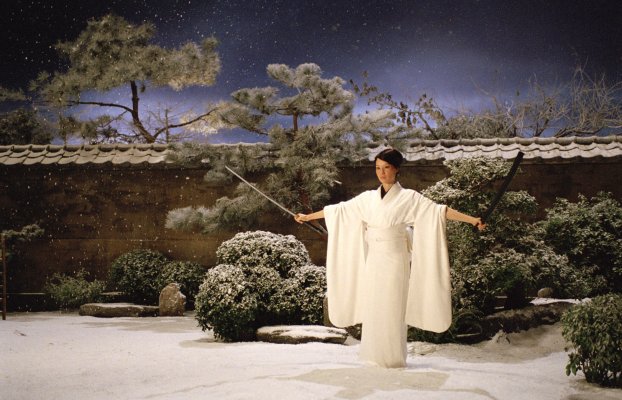 1) The Editing. Perhaps it’s a result of chopping the film in two, but there are several scenes here badly in need of shortening, which is doubly strange given how perfectly — languidly, with occasional jolts and rushes — QT’s first three films move. Take, for example, all of Chapter 4 (The Man from Okinawa), and particularly the sake-pouring nonsense. Ok, I get it — it’s Sonny Chiba (and, I’ve since been informed, Gordon Liu)…but let’s move on. Jackie Brown moves at a leisurely pace, yet I was and am never bored. In Kill Bill I was stifling yawns. Or take the introduction of Buck’s Pussy Wagon (which at best is a sophomoric, throwaway joke anyway.) Uma gets the keys from Buck, beats him a final time, looks for the car, finds the car, looks at the keys, looks at the car, gets in the car. All this could’ve been condensed into one edit (from the hospital floor to Uma dragging herself into the Wagon), particularly as the joke was already made in Chapter 1 anyway.
1) The Editing. Perhaps it’s a result of chopping the film in two, but there are several scenes here badly in need of shortening, which is doubly strange given how perfectly — languidly, with occasional jolts and rushes — QT’s first three films move. Take, for example, all of Chapter 4 (The Man from Okinawa), and particularly the sake-pouring nonsense. Ok, I get it — it’s Sonny Chiba (and, I’ve since been informed, Gordon Liu)…but let’s move on. Jackie Brown moves at a leisurely pace, yet I was and am never bored. In Kill Bill I was stifling yawns. Or take the introduction of Buck’s Pussy Wagon (which at best is a sophomoric, throwaway joke anyway.) Uma gets the keys from Buck, beats him a final time, looks for the car, finds the car, looks at the keys, looks at the car, gets in the car. All this could’ve been condensed into one edit (from the hospital floor to Uma dragging herself into the Wagon), particularly as the joke was already made in Chapter 1 anyway.
2) The Dialogue. With the possible exception of Lucy Liu’s words of wisdom for the Yakuza council — one of the best moments in the film — there is hardly a single memorable line in all of Kill Bill. Again, this is bizarre for a Tarantino flick, which as everyone knows have been distinguished by their dialogue. Ok, so samurai are generally strong, silent types…that doesn’t forgive the banality of what’s actually being said most of the time. “Silly rabbit…Trix are for kids”? C’mon. And, aside from the ridiculous number of grindhouse chop-socky in-jokes, most of the pop-culture visuals in Kill Bill seem lazy and off-hand (For example, the fellow in the Charlie Brown kimono – which not only added nothing to the film but could be seen coming a mile away.)
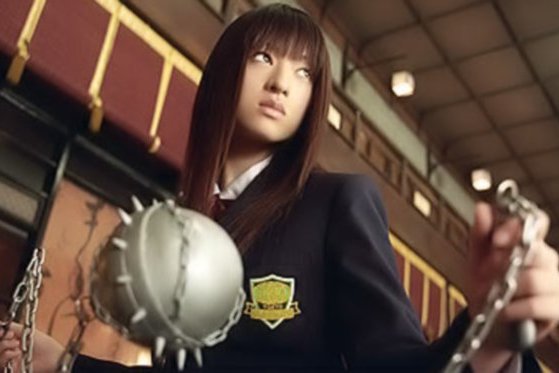 3. The Action. Of course QT has no obligation to make movies like the ones he’s made previously, so both the editing and dialogue problems could have been overlooked if Kill Bill had succeeded in its main intent. But, sadly, it doesn’t. Amazingly, given the input of Master Yuen Wo-Ping, almost all of the action sequences in Kill Bill are dull, stilted, and boring, and none more so than the much-hyped House of Blue Leaves. Really. I was shocked at how off they seemed to be. Perhaps its because Uma Thurman couldn’t handle the martial arts choreography for extended shots, but I think it’s more likely that QT just isn’t a very good action director. Too many quick edits, too many goofy shots (the blue silhouette sequence was embarrassing, as was the spanking at the end.)….It’s just sad. Even fights that held great promise (Go-Go Yubari, a homicidal Japanese schoolgirl with a tricked-up mace…really, how can you screw this up? Same goes for O-Ren-Ishii in the snow) seemed flat and lifeless. Somewhere down the pike, QT must’ve decided that gore is the end-all, be-all of a good action sequence, but arterial sprays aside, there’s really not much to see here (and the whole hilarious gore bit was done better in films like Dead Alive anyway.) QT made a point recently of attacking the fights in The Matrix movies, but I’ll take those anyday over the jumbled morass of bad wire-fu and chop edits on display here. And one needs only to recall the breathtaking wire-fu fights of Crouching Tiger, Hidden Dragon, where the camera pulls back and allows the combatants to strut their stuff in extended takes, to see how badly misplayed QT’s action edits are here.
3. The Action. Of course QT has no obligation to make movies like the ones he’s made previously, so both the editing and dialogue problems could have been overlooked if Kill Bill had succeeded in its main intent. But, sadly, it doesn’t. Amazingly, given the input of Master Yuen Wo-Ping, almost all of the action sequences in Kill Bill are dull, stilted, and boring, and none more so than the much-hyped House of Blue Leaves. Really. I was shocked at how off they seemed to be. Perhaps its because Uma Thurman couldn’t handle the martial arts choreography for extended shots, but I think it’s more likely that QT just isn’t a very good action director. Too many quick edits, too many goofy shots (the blue silhouette sequence was embarrassing, as was the spanking at the end.)….It’s just sad. Even fights that held great promise (Go-Go Yubari, a homicidal Japanese schoolgirl with a tricked-up mace…really, how can you screw this up? Same goes for O-Ren-Ishii in the snow) seemed flat and lifeless. Somewhere down the pike, QT must’ve decided that gore is the end-all, be-all of a good action sequence, but arterial sprays aside, there’s really not much to see here (and the whole hilarious gore bit was done better in films like Dead Alive anyway.) QT made a point recently of attacking the fights in The Matrix movies, but I’ll take those anyday over the jumbled morass of bad wire-fu and chop edits on display here. And one needs only to recall the breathtaking wire-fu fights of Crouching Tiger, Hidden Dragon, where the camera pulls back and allows the combatants to strut their stuff in extended takes, to see how badly misplayed QT’s action edits are here.
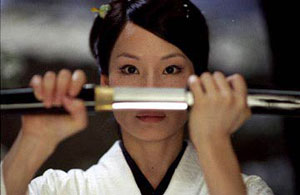 The Upside: Well, not much, really. There’s some great opportunities here, and I’d say Tarantino squanders most of ’em. I liked the anime sequence in the middle of the film, and the introduction of O-Ren-Ishii’s squad (Go-Go, Sofie Fatale, etc.) had a great comic book flavor to it at first. I thought RZA’s work on the soundtrack was superb. The critics on the film geek end of the spectrum (David Edelstein, Roger Ebert) adored all the in-jokes scattered throughout the film, and I’m sure most of ’em went over my head. (I don’t think, however, that this excuses the film by any means — LotR, for example, is filled with Tolkie in-jokes while still being accessible to laypersons.) Who knows? Perhaps if Kill Bill had just been another film, I might not be so harsh about it. But I expected more from this much-heralded return of Tarantino…I hope this was just an inglorious misstep, and I’ll probably go see Vol. 2 (word is the second one is more character-driven anyway). But I thought Quentin drank his own Kool-Aid with Kill Bill: Volume One, and hopefully he’ll return to his senses someday soon.
The Upside: Well, not much, really. There’s some great opportunities here, and I’d say Tarantino squanders most of ’em. I liked the anime sequence in the middle of the film, and the introduction of O-Ren-Ishii’s squad (Go-Go, Sofie Fatale, etc.) had a great comic book flavor to it at first. I thought RZA’s work on the soundtrack was superb. The critics on the film geek end of the spectrum (David Edelstein, Roger Ebert) adored all the in-jokes scattered throughout the film, and I’m sure most of ’em went over my head. (I don’t think, however, that this excuses the film by any means — LotR, for example, is filled with Tolkie in-jokes while still being accessible to laypersons.) Who knows? Perhaps if Kill Bill had just been another film, I might not be so harsh about it. But I expected more from this much-heralded return of Tarantino…I hope this was just an inglorious misstep, and I’ll probably go see Vol. 2 (word is the second one is more character-driven anyway). But I thought Quentin drank his own Kool-Aid with Kill Bill: Volume One, and hopefully he’ll return to his senses someday soon.
Deconstructing Harvey.
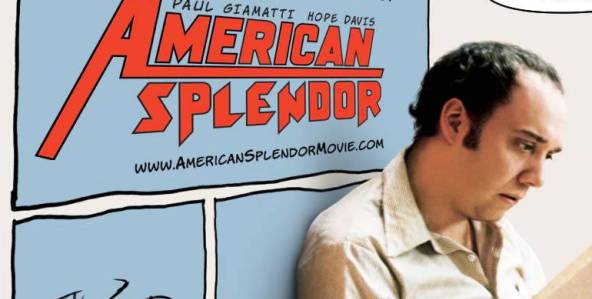
After a few weeks of circling around it, I finally caught American Splendor Thursday night and…I’m finding it a hard movie to write about. On one hand, the film works as a great introduction and overview to the weird world of cartoonist, file clerk, and now weblogger extraordinaire Harvey Pekar. (Indeed, as David Edelstein notes, with its litany of daily mundanities endured and overcome, Pekar’s comic seems an early ancestor of the blog.) The film does a great job of appropriating comic book syntax to tell its story (and in so doing makes Ang Lee’s recent flop look even worse.) And the performances are all quite good, particularly Hope Davis as Pekar’s third wife Joyce Brabner.
All that being said, I admired the film as an intellectual exercise, but never really connected to it emotionally. With a nod to Annie Hall (and of course, the original American Splendor comic), the movie breaks the fourth wall early and often and continually makes a point of its own artifice. But, as a result (and I know this was the point, made explicit with the Donal Logue/Molly Shannon sequence), much of the film came off as artificial and thus not very interesting – I found myself waiting patiently through the Giamatti-Davis scenes just to get another glimpse of the real Pekar, whose impish energy was much more engaging than anything else in the film. (Along the same lines, I thought Splendor also suffered in light of the brilliant and disturbing Crumb – James Urbaniak does a really great Robert Crumb impression, but the memory of that hard-to-forget documentary made him seem all the more like an actor doing an impression.) Moreover, once the story enters the “Our Cancer Year” period, which is obviously a crucial and necessary element of Pekar’s life trajectory, the film takes on the additional thematic weight of encroaching mortality and disease overcome, which is a far cry from the daily dilemmas and annoyances that animate the Splendor comic. As a result, the film seems to devolve in the final third into a conventional biopic. In the end, I enjoyed the movie, and particularly the first half, which feels more like Pekar’s work. But I ultimately found myself thinking that my time with Pekar might have been better spent if I had just unearthed the old issues of American Splendor and started reading. (Pekar blog link via Lake Effect.)
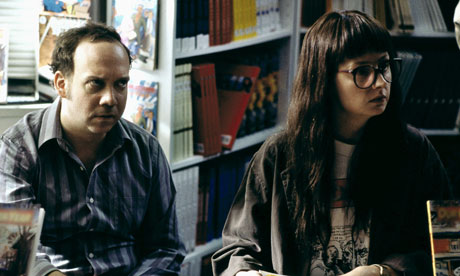
Hello, Cruel World.
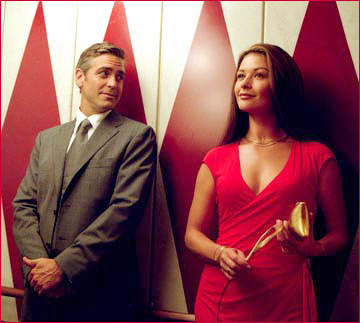 So some friends of mine managed to secure early passes to Intolerable Cruelty, and I’m pleased to report that the Coens’ first foray into full-fledged romantic comedy (although one could argue for The Hudsucker Proxy) is an out-and-out winner. I’d heard earlier that the Coens had diluted their trademark zaniness for the sake of a mainstream audience this time around, but I found the reverse to be true — the brothers have instead juiced up what could have been a tired genre exercise (Imagine this film with Matthew McConaughey, Hugh Grant, Kate Hudson, or Sandra Bullock) with their unique flair and managed to create one of the best, funniest romantic comedies I’ve seen in some time. George Clooney – whom I generally like – is better here as the smooth, almost-imperturbable dental-obsessive Miles Massey than he ever was in O Brother (where he was also good but ever so slightly miscast), and Catherine Zeta-Jones makes for a stunning and worthy adversary as Marilyn Rexroth, eater of men. As for the rest of the cast, they — except for perhaps Geoffrey Rush, who is a little too manic — revel in the type of quality and/or hilarious supporting parts that the Coens continually provide (along with the big names, keep an eye out for Newhart‘s Julia Duffy and, ever so briefly, Bruce Campbell.)
So some friends of mine managed to secure early passes to Intolerable Cruelty, and I’m pleased to report that the Coens’ first foray into full-fledged romantic comedy (although one could argue for The Hudsucker Proxy) is an out-and-out winner. I’d heard earlier that the Coens had diluted their trademark zaniness for the sake of a mainstream audience this time around, but I found the reverse to be true — the brothers have instead juiced up what could have been a tired genre exercise (Imagine this film with Matthew McConaughey, Hugh Grant, Kate Hudson, or Sandra Bullock) with their unique flair and managed to create one of the best, funniest romantic comedies I’ve seen in some time. George Clooney – whom I generally like – is better here as the smooth, almost-imperturbable dental-obsessive Miles Massey than he ever was in O Brother (where he was also good but ever so slightly miscast), and Catherine Zeta-Jones makes for a stunning and worthy adversary as Marilyn Rexroth, eater of men. As for the rest of the cast, they — except for perhaps Geoffrey Rush, who is a little too manic — revel in the type of quality and/or hilarious supporting parts that the Coens continually provide (along with the big names, keep an eye out for Newhart‘s Julia Duffy and, ever so briefly, Bruce Campbell.)
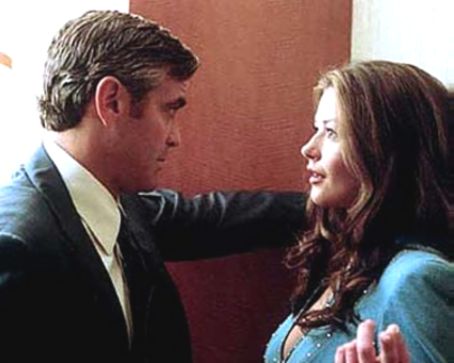 I suppose faults could be found with the predictableness of it all – the movie does follow the traditional romantic comedy story arc the way through. But, the Coens still manage to squeeze in a few clever twists along the way. I dunno…it just worked for me. On one hand, there are goofy, slapstick moments in Intolerable Cruelty (one involving spray mace, for example) that you can see a mile off and normally would have fallen flat, but are redeemed by Clooney and the Coens, who all appear to be working effortlessly. On the other, there are plenty of clever quips and sight gags (the waiting room magazine, or Clooney’s assistant’s T-shirt in the tennis scene) that prove how funny the creators of The Big Lebowski and Raising Arizona can be when they’re in a groove. Cruelty isn’t as funny as either of those two films, nor as memorable as Fargo or Miller’s Crossing, but it is an excellent entry in the romantic comedy genre, with just enough Coen to keep you laughing. Take it as such, and you should have a grand ole time.
I suppose faults could be found with the predictableness of it all – the movie does follow the traditional romantic comedy story arc the way through. But, the Coens still manage to squeeze in a few clever twists along the way. I dunno…it just worked for me. On one hand, there are goofy, slapstick moments in Intolerable Cruelty (one involving spray mace, for example) that you can see a mile off and normally would have fallen flat, but are redeemed by Clooney and the Coens, who all appear to be working effortlessly. On the other, there are plenty of clever quips and sight gags (the waiting room magazine, or Clooney’s assistant’s T-shirt in the tennis scene) that prove how funny the creators of The Big Lebowski and Raising Arizona can be when they’re in a groove. Cruelty isn’t as funny as either of those two films, nor as memorable as Fargo or Miller’s Crossing, but it is an excellent entry in the romantic comedy genre, with just enough Coen to keep you laughing. Take it as such, and you should have a grand ole time.
Return of the King.

Well, I really wish I could report that Bubba Ho-Tep, in which Elvis Presley [Bruce Campbell (!)] and JFK [Ossie Davis (?!)] team up to save their East Texas retirement home from an ancient soul-sucking mummy, is as hilarious as the premise. But, sadly, once you get past the high-concept comedy, you’re left with a bunch of low-brow buffoonery and a stalled story that moves slower than even these aging convalescents. For his part, Campbell swings for the fences, and does a surprisingly wistful turn on the King, but unfortunately he has very little to work with here. It seems the writers never got very far past the founding conceit of having these two icons team up, so neither do we.
As a comedy, Bubba Ho-Tep is only intermittently funny. The best two scenes both involve Reservoir Dogs-style slo-mo hero shots – you’ll know ’em when you see ’em. The rest of the jokes are scattershot and many, particularly the ones involving the two undertakers, are just D.O.A. As a horror movie…well, this isn’t scary at all. Ho-tep and his flock of giant scarabs are played for laughs. (So, of course, was all of Evil Dead 2, — Campbell’s finest hour — but I’ll submit that the mother-zombie singing the Mockingbird song at the basement door is genuinely creepy.) Surprisingly, Bubba Ho-Tep probably works best as a meditation on aging. Entirely too much of the narrative is propelled by an Elvis/Campbell voiceover, but his twilight ruminations do occasionally add a touch of poignancy to this story of legends laid low by the ravages of time. Not enough, sadly, to recommend the film, though. Campbell is good, but Bubba Ho-Tep is all set-up and no follow-through.
Immigrant Song.
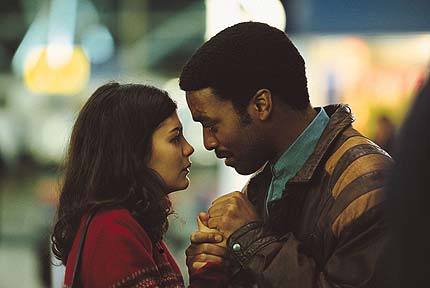
So, in my abortive attempt to catch the RotK trailer Friday night — Sony Lincoln Square wisely put Secondhand Lions in the basement theater to stop people like me from sneaking in for the previews…well played, y’all — I ended up seeing Stephen Frears’s Dirty Pretty Things, starring Chiwetel Ejiofor and Audrey Tautou. Worth seeing (although I preferred Lost in Translation), DPT is a tale of immigrant woe that starts very strong and gets weaker as it goes along. Holding down a number of dead-end jobs and chewing qat to stay awake at all hours of the day, a Nigerian-born doctor in London (Ejiofor, in a captivating, star-making performance) finds a hotel toilet clogged by a human heart. While this grisly discovery is never satisfactorily explained, it nevertheless propels him into an underworld organ-selling network that thrives on London’s most desperate new arrivals.
Ejiofor is great throughout the film, and DPT strikingly portrays how his character Okwe can get pretty much anywhere just by acting like the help. That being said, I thought the narrative lost its considerable momentum when the denouement becomes obvious, and when Frears made the implicit “invisible immigrant” theme too explicit. (He gives Ejiofor some pithy bon mots near the end about the plight of the unseen, just in case you’ve somehow missed the point thus far.) Plus, once you get past Okwe and arguably Tautou’s Senay, you basically end up with a lot of stereotyped characters straight out of Central Casting — the drunk and fun-loving Russian, the hooker with the heart of gold, the Asian morgue-worker who plays chess and ruminates on the Afterlife, the two INS guys who inexplicably take an interest in Tautou (and equally inexplicably follow her from job to job – How exactly did they find her at the sweatshop, and why did they care so much? Just a sentence or two of explanation would’ve satisfied me.) Still, while the film may never deliver on its early promise, it is enjoyable and thought-provoking throughout, and Ejiofor is very, very good – I hope to see more from him in the future.
Beckinsale Bites.
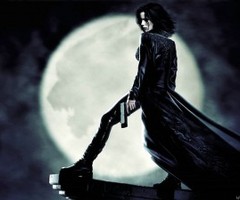 So as membership dues for the fanboy nation, I went to go see Len Wiseman’s Underworld last night…woo boy. Kate Beckinsale literally vamping in a tight-fitting leather catsuit — what’s to screw up, right? A lot, apparently. The lack of imagination that went into this flick is embarrassing. Instead of playing with their own founding conceit of vampires vs. werewolves, the movie just happily, stupidly rides along in its faux-Matrix groove. The lycans don’t find any inventive uses for garlic, crosses, or wooden stakes – they just shoot ridiculous amounts of tricked-up ammo at the bloodsuckers, and vice versa. There’s entirely too many laugh-out-loud moments and most of the film makes no sense. Characters keep getting shot with the same weaponry to different effect (Does silver heal, kill, wound, or what?) And then there’s this fellow Shane Brolly — who plays Kraven, nominal head of the vampires until an elder awakens — who may just be the worst actor I’ve ever seen in a major motion picture. (The problem might have been the American accent – I got the sense it wasn’t his.) At any rate, I had grievously low expectations for this flick, and they were not met. To make the obligatory vampire pun, Underworld sucked.
So as membership dues for the fanboy nation, I went to go see Len Wiseman’s Underworld last night…woo boy. Kate Beckinsale literally vamping in a tight-fitting leather catsuit — what’s to screw up, right? A lot, apparently. The lack of imagination that went into this flick is embarrassing. Instead of playing with their own founding conceit of vampires vs. werewolves, the movie just happily, stupidly rides along in its faux-Matrix groove. The lycans don’t find any inventive uses for garlic, crosses, or wooden stakes – they just shoot ridiculous amounts of tricked-up ammo at the bloodsuckers, and vice versa. There’s entirely too many laugh-out-loud moments and most of the film makes no sense. Characters keep getting shot with the same weaponry to different effect (Does silver heal, kill, wound, or what?) And then there’s this fellow Shane Brolly — who plays Kraven, nominal head of the vampires until an elder awakens — who may just be the worst actor I’ve ever seen in a major motion picture. (The problem might have been the American accent – I got the sense it wasn’t his.) At any rate, I had grievously low expectations for this flick, and they were not met. To make the obligatory vampire pun, Underworld sucked.
Japanese Whispers.
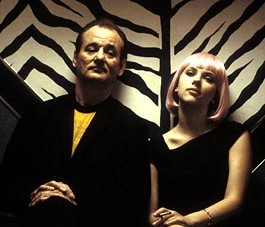 So I finally broke my month-long movieless streak last night with Lost in Translation, an unflinching look at the agony and torment of the human soul that is lying around your five-star Tokyo hotel with nothing to do. I’m a bit conflicted on this one…It’s definitely worth seeing – The film is funny, touching, sweet, often entrancing, and Bill Murray is really wonderful in the lead. It captures the disembodied detachment of travel insomnia and the exquisite anticipation of a newly-made connection in ways that belie the standard Hollywood older-man-meets-younger-woman narrative (Re: mogul wish fulfillment.)
So I finally broke my month-long movieless streak last night with Lost in Translation, an unflinching look at the agony and torment of the human soul that is lying around your five-star Tokyo hotel with nothing to do. I’m a bit conflicted on this one…It’s definitely worth seeing – The film is funny, touching, sweet, often entrancing, and Bill Murray is really wonderful in the lead. It captures the disembodied detachment of travel insomnia and the exquisite anticipation of a newly-made connection in ways that belie the standard Hollywood older-man-meets-younger-woman narrative (Re: mogul wish fulfillment.)
All that being said, I do have nagging problems with Translation. For one, as I alluded above, this story could only have been written by deeply privileged people: I found it hard to empathize with Scarlett Johansson’s Charlotte, who responds to being alone on the far side of the world with all kinds of time on her hands mainly by sitting in her hotel room and feeling miserable. (It makes more sense with Murray’s Bob, who’s clearly seen and done it all by now.)
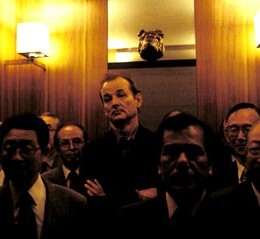 Plus, it often seems like Sofia Coppola is calling out a few hits on people throughout the film. Charlotte’s busy, self-absorbed photographer husband (Giovanni Ribisi) seems less than a degree of separation from Spike Jonze, and the story takes time out to bag on white hip-hoppers (the Beasties?) and film starlets (Anna Faris of May, basically playing a cruel version of Cameron Diaz) in a manner that I found more vindictive than funny. (There’s an exchange involving Evelyn Waugh that – perhaps it’s meant to be this way – makes Charlotte seem deeply unsympathetic, exactly the type of know-it-all snob you wouldn’t want to spend a week in Tokyo with.) In fact, the movie wants to have it both ways – when Bob and Charlotte karaoke classic songs by Elvis Costello, The Pretenders, and Roxy Music (One of the best uses of music since Donnie Darko, even if the choices seem more like Coppola’s than the characters), it’s relationship development…A few scenes later, when the starlet character belts out Carly Simon, it’s a sight gag. Finally, while Translation makes a great postcard for Tokyo, there end up being just a few too many “zany Japanese” engrish jokes and setpieces.
Plus, it often seems like Sofia Coppola is calling out a few hits on people throughout the film. Charlotte’s busy, self-absorbed photographer husband (Giovanni Ribisi) seems less than a degree of separation from Spike Jonze, and the story takes time out to bag on white hip-hoppers (the Beasties?) and film starlets (Anna Faris of May, basically playing a cruel version of Cameron Diaz) in a manner that I found more vindictive than funny. (There’s an exchange involving Evelyn Waugh that – perhaps it’s meant to be this way – makes Charlotte seem deeply unsympathetic, exactly the type of know-it-all snob you wouldn’t want to spend a week in Tokyo with.) In fact, the movie wants to have it both ways – when Bob and Charlotte karaoke classic songs by Elvis Costello, The Pretenders, and Roxy Music (One of the best uses of music since Donnie Darko, even if the choices seem more like Coppola’s than the characters), it’s relationship development…A few scenes later, when the starlet character belts out Carly Simon, it’s a sight gag. Finally, while Translation makes a great postcard for Tokyo, there end up being just a few too many “zany Japanese” engrish jokes and setpieces.
But, not to lose the forest for the trees, I did quite like Lost in Translation. The film is honest and poignant in its depiction of two ships passing in the night, and Bill Murray – almost always good these days – is outstanding. Only once in the film, when he and Charlotte chase the Suntory whiskey bus, did he seem to slip into traditional Ghostbusters-era Bill Murray-dom. The rest of the time, Murray’s a sadder, sleepier, and more resigned fellow than the wiseass we’re accustomed to on the screen. Even scenes with patently unbelievable dialogue (Bob talking to his wife in the bath, for example) are redeemed by Murray here. His performance alone makes the movie worth seeing, and I wouldn’t be surprised if he’s given a nod somewhere come award time.
Mother, do you think they’ll drop the bomb?
IGN gets an exclusive trailer for what will undoubtedly be the scariest movie in theaters this Halloween – the Alien Director’s Cut. Apparently, the famous Brett & Dallas in the nest scene has been re-added (despite it contradicting the xenoform life cycle of the later films.) Either way, from the Nostromo’s sMothering AI to Ash spewing milk all over the place to Kane’s “unwanted pregnancy,” twenty years later Alien is still scary – and subversive – as hell.
Ballad of a Thin Man.
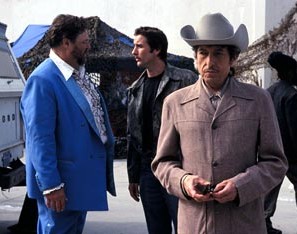 So I went down to the Angelika yesterday afternoon (always a strange experience – you can hear and feel the subway running under you during films) to catch Masked and Anonymous and, well, I can only recommend this film to two types of people: Hard-core Dylanologists, and those cinema completists who need to see Ed Harris in blackface. I consider myself a pretty heavy-duty Dylan fan, and even I was a bit bored at certain points. The movie is basically Dylan’s version of Waking Life, or what might happen if Bob had entered his own portal a la Being John Malkovich. All of the characters in the film speak in Dylanistic soliloquys (You actually get a very good sense of this from the website), and thus you end up with Giovanni Ribisi’s disquisition on war, Val Kilmer’s take on animals, etc. The movie takes place in a strange alternate present, where (I’m guessing) the revolutions of the Sixties went sour and ended up tearing the nation apart. Dylan’s dad seems to be the ailing leader of the Bearflag Republic or something, and…well, there’s no point in trying to explain it.
So I went down to the Angelika yesterday afternoon (always a strange experience – you can hear and feel the subway running under you during films) to catch Masked and Anonymous and, well, I can only recommend this film to two types of people: Hard-core Dylanologists, and those cinema completists who need to see Ed Harris in blackface. I consider myself a pretty heavy-duty Dylan fan, and even I was a bit bored at certain points. The movie is basically Dylan’s version of Waking Life, or what might happen if Bob had entered his own portal a la Being John Malkovich. All of the characters in the film speak in Dylanistic soliloquys (You actually get a very good sense of this from the website), and thus you end up with Giovanni Ribisi’s disquisition on war, Val Kilmer’s take on animals, etc. The movie takes place in a strange alternate present, where (I’m guessing) the revolutions of the Sixties went sour and ended up tearing the nation apart. Dylan’s dad seems to be the ailing leader of the Bearflag Republic or something, and…well, there’s no point in trying to explain it.
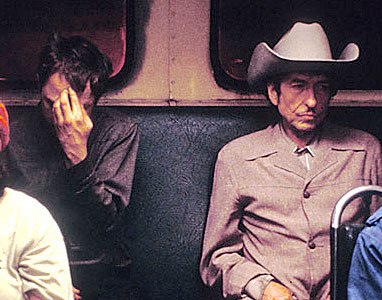 The movie is basically an extended riff on Dylan and Dylania…at (brief) moments it has the scope and absurdist grandeur of “Desolation Row,” “Idiot Wind,” or “It’s Alright Ma.” And some of the renditions of Dylan’s music, from the new “One More Cup of Coffee” to the acapella “The Times, They Are a Changin’” are truly beautiful. Most of the time, however, it fails to capture Dylan’s spark, and comes off flat and, well, embarrassing (particularly in some of the more questionable racial choices.) I think the extended monologues on life, death, and humanity are meant to have you dwell on the fundamental questions, but as the movie wore on I found myself contemplating altogether different queries: Did Chris Penn eat one of the Baldwins? Who would win in a caged deathmatch between Penelope Cruz and Audrey Tautou? Who knew it would end so badly between Walter and the Dude? When did Mickey Rourke turn into Billy Bob Thornton? So on, so on. I guess I’d recommend that Dylan fans see this film (particularly if you’ve sat through Renaldo & Clara), just to see where our man is at these days. (In fact, some Dylan fans seem to love it.) All in all, though, I can’t say I recommend the film as a film.
The movie is basically an extended riff on Dylan and Dylania…at (brief) moments it has the scope and absurdist grandeur of “Desolation Row,” “Idiot Wind,” or “It’s Alright Ma.” And some of the renditions of Dylan’s music, from the new “One More Cup of Coffee” to the acapella “The Times, They Are a Changin’” are truly beautiful. Most of the time, however, it fails to capture Dylan’s spark, and comes off flat and, well, embarrassing (particularly in some of the more questionable racial choices.) I think the extended monologues on life, death, and humanity are meant to have you dwell on the fundamental questions, but as the movie wore on I found myself contemplating altogether different queries: Did Chris Penn eat one of the Baldwins? Who would win in a caged deathmatch between Penelope Cruz and Audrey Tautou? Who knew it would end so badly between Walter and the Dude? When did Mickey Rourke turn into Billy Bob Thornton? So on, so on. I guess I’d recommend that Dylan fans see this film (particularly if you’ve sat through Renaldo & Clara), just to see where our man is at these days. (In fact, some Dylan fans seem to love it.) All in all, though, I can’t say I recommend the film as a film.
On another note, in the two hours I had to kill between this movie and seeing a friend’s (very good) band at the Baggot Inn, I stumbled upon a huge line at Tower Records, dutifully waiting to get Dave Gahan‘s signature. Times change, I guess. Ten years ago, I probably would have staked out this line with a handful of vinyl 12″ DM singles. Nowadays, I just skipped it in favor of Forbidden Planet and The Strand. Must be getting old.
